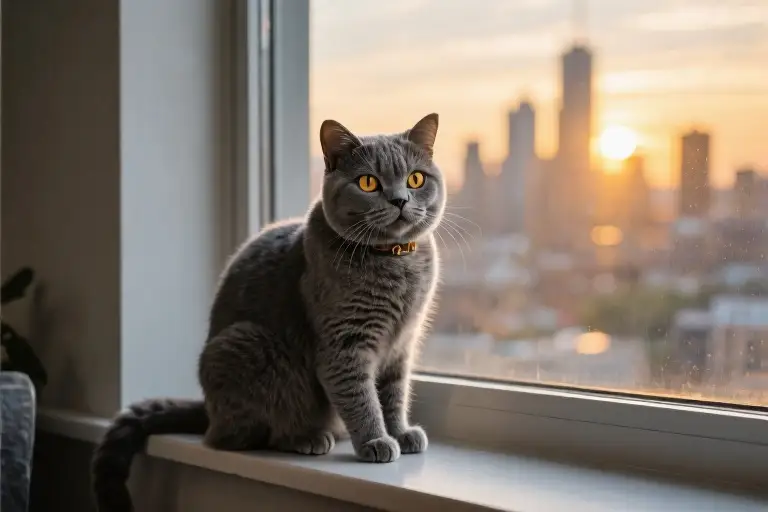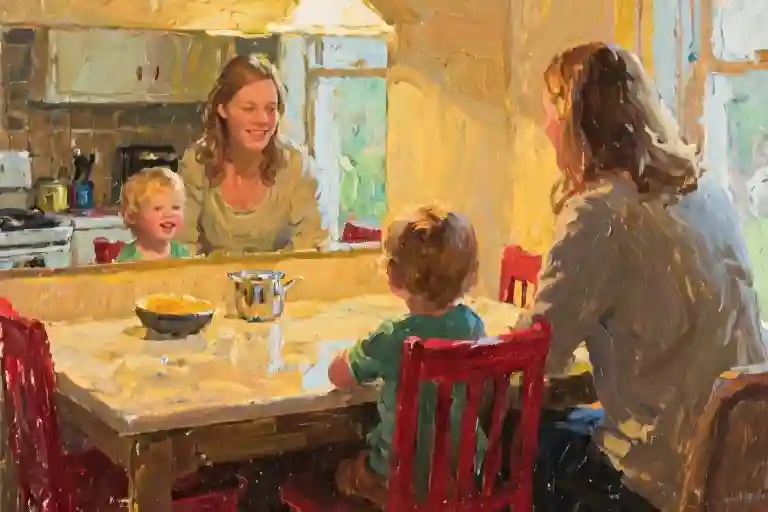The video call window framed my therapist’s slightly pixelated face as he adjusted his glasses, waiting for me to articulate what should have been a simple answer. Behind me, a crash echoed from the kitchen – the familiar sound of Odette knocking over her stainless steel bowl again. My eyes darted to the corner of the screen where imported cat food pellets now scattered across my freshly mopped floor.
‘She has everything,’ I heard myself say, fingers twisting the hem of my sweater. ‘Organic food, automated toys, even that ridiculous $200 cat tree by the window.’ My voice climbed an octave without permission. ‘So why does she keep lecturing me with those judgmental yowls at 3 AM?’
The therapist’s cursor blinked rhythmically in the silence that followed. Through my laptop speakers, Odette’s discontented mrrp punctuated the moment like a punctuation mark. On the coffee table beside me, the receipt for her latest gourmet salmon feast lay next to an unopened bottle of anti-anxiety medication.
When the question finally came, it sliced through my carefully constructed frustration with surgical precision: ‘Do you speak cat?’
In the background, Odette leapt onto the counter with the grace of a creature utterly unaware she’d become the focal point of a human existential crisis. Her tail flicked once, sending a half-empty wine glass wobbling – another casualty in our ongoing battle of misunderstood intentions. The therapist’s raised eyebrow mirrored my own reflection in the dark monitor, two humans united in silent acknowledgment of the absurdity: here we were, dissecting feline vocalizations when the real issue sat trembling on my couch, clutching a cat hair-covered throw pillow.
Through the window, Toronto’s skyline glittered indifferently. Somewhere in the city, other lonely pandemic adoptees were probably having similar one-sided conversations with their pets. The thought should have comforted me. Instead, I found myself staring at Odette’s pristine water fountain – its gentle burble a stark contrast to the storm of human neediness swirling in my chest.
The Empty Apartment Chronicles
The moving boxes stood like cardboard sentinels in my Toronto apartment, their flaps still sealed with the same industrial-strength tape that had secured my life back in Montreal. A single knife slit through the largest box marked ‘KITCHEN’ revealed not pots and pans, but three bottles of hand sanitizer and an unopened pack of surgical masks – pandemic relics that had somehow become permanent decor. Outside my floor-to-ceiling windows, the CN Tower blinked its nightly quarantine light show, bathing the stacks of unpacked belongings in clinical red light.
I’d imagined this move would be different. At thirty-two, I was supposed to be building the curated life I’d pinned on Pinterest – the one with gallery walls and a perpetually simmering pot of artisan pasta sauce. Instead, I found myself conducting entire conversations with Siri and developing an unhealthy attachment to my DoorDash delivery guy. The silence of the apartment had become so thick I could hear the hum of the smart fridge adjusting its temperature.
Then came The Friendship Incident. I still can’t say Jessica’s name without my throat tightening. Six years of shared secrets, emergency airport pickups, and ‘sister from another mister’ Instagram captions evaporated when I discovered her elaborate web of lies. The betrayal wasn’t just about the fabricated cancer scares or the fake job offers – it was the realization that my human barometer was fundamentally broken. How could I not have known?
‘You need something alive that can’t lie to you,’ my coworker Mark said during our weekly Zoom happy hour, his pixelated face peering at my barren apartment behind me. ‘Get a plant. Or a fish. Start small.’
But small wasn’t what my aching heart wanted. I needed warm, breathing proof that I wasn’t completely unlovable. That’s how I found myself pressing my forehead against the cool glass of the Toronto Humane Society’s adoption room one rainy April afternoon, watching a slate-gray British shorthair bat at a feather toy with surgical precision.
‘Her name’s Odette,’ the volunteer said, mistaking my hesitation for curiosity. ‘She’s particular about her space – very independent.’
The word ‘independent’ echoed in my hollow chest. Here was the perfect solution: a creature who wouldn’t demand constant validation but would still grace me with occasional affection. A living being who wouldn’t disappear after borrowing my favorite sweater. An emotional support animal that didn’t come with the stigma of needing emotional support.
‘Cats are different from dogs,’ I rehearsed in my head as I signed the adoption papers. ‘They have their own lives. They need their own space.’ The mantra became my psychological permission slip – if this beautiful, aloof creature could maintain her boundaries while living in my apartment, maybe I could relearn how to have mine too.
What nobody told me was that cat independence works both ways. That ‘having their own space’ often translates to ‘your bed is now their throne.’ That the silent companionship I craved would come with 3 AM yowling sessions and the distinct sensation of being judged by something that weighs eight pounds. But in that moment, watching Odette’s tiny pink tongue poke out as she groomed her paw, all I saw was the antidote to my loneliness – a small, furry mirror that would reflect back exactly the love I needed.
Little did I know, mirrors don’t meow.
When the Dream Cat Meets Reality
The warnings came like well-meaning fortune cookies: Cats need their own space. They’re not like dogs. You’ll barely notice they’re there. I nodded eagerly at each pronouncement, secretly thrilled by the prospect of a low-maintenance companion who’d respect my personal boundaries. After all, I’d chosen cat ownership specifically to avoid the neediness I associated with other pets.
Three months later, I found myself staring at a $400 self-cleaning litter box that Odette had used exactly once before deciding my potted ficus made a more suitable toilet. The designer cat tree from Sweden? Currently serving as a very expensive laundry rack. And those organic salmon treats that cost more per ounce than my antidepressant medication? Scattered across the floor like tiny orange rejection slips.
Our nightly routine became a surreal performance art piece:
- 3:07 AM: Piercing meow directly into my left ear canal
- 3:09 AM: Inspection of food bowl containing precisely 37 pieces of uneaten kibble
- 3:11 AM: Dramatic collapse onto my chest while I google cat vocalization mental illness
- 3:13 AM: Sudden sprint across apartment knocking over water glass (always full)
The irony wasn’t lost on me. I’d adopted a cat craving independence, only to become obsessed with deciphering every flick of her tail. When she ignored the handcrafted scratching post to sharpen her claws on my work chair, I took it personally. Her middle-of-the-night concerts felt like Yelp reviews of my caretaking skills. That aloofness my friends promised? Turned out it wasn’t the blissful coexistence I’d imagined – just a different flavor of neediness that left me constantly guessing.
What no one mentioned about cats needing space was how much mental real estate they’d occupy anyway. The more I tried to respect Odette’s autonomy, the more I anthropomorphized her behaviors. Her casual disregard for expensive toys became commentary on my worthiness. Her random 3 AM zoomies transformed into existential indictments of my life choices.
Looking back, the warning signs were there from adoption day. When the shelter worker said She’s very particular, I heard She’ll appreciate all your thoughtful efforts. When my friend joked Cats train humans, not the other way around, I assumed that was just something people said about toddlers and rich uncles.
The reality of cat ownership revealed an uncomfortable truth: my fantasy of harmonious coexistence required Odette to be just independent enough to soothe my guilt about being a busy single person, but just affectionate enough to validate me. Instead, I got a living Rorschach test – one that yowled at closed doors and judged my grocery store brand paper towels.
Perhaps the greatest irony? All those warnings about cats needing space were technically correct. They just failed to account for how much space a tiny creature can occupy in a lonely human’s psyche – especially when that human mistakes independence for indifference.
The Language Barrier
I became fluent in Odette’s supposed disapproval. The way she dragged her claws down my new couch wasn’t just scratching—it was retaliation for leaving her alone during my work calls. Her 3am yowls weren’t biological impulses but calculated critiques of my life choices. When she ignored the $80 interactive feeder, I could practically hear her sigh: This human never gets me right.
My browser history told the story:
- Why does my cat stare at me judgmentally?
- Do cats hold grudges after vet visits?
- Feline passive aggression signs
Animal behavior websites became my Rosetta Stone, though I seemed to be translating everything through a filter of personal insecurity. The scientific fact that cats rarely meow at other cats morphed in my mind to: She’s inventing new sounds just to torment me.
Then came the therapy session that changed everything. During a particularly animated retelling of Odette’s latest ‘protest’ (knocking over my water glass during an important Zoom meeting), my therapist remained silent for thirteen seconds—I counted. His webcam framed just his raised eyebrow and the edge of a bookshelf behind him.
“Do you speak cat?”
The question hung in the air like a cat mid-leap. On my desk, Odette’s organic salmon treats sat beside my forgotten antidepressants. The parallel hit me with the force of a pouncing kitten: I’d been interpreting her behavior through my own unmet needs for connection.
Later that night, I watched Odette methodically lick her paw and wipe her ear—the same routine she’d performed daily since adoption. Only now I noticed the complete absence of human-directed emotion in the act. Her ‘haranguing’ had never existed outside my loneliness-steeped interpretations.
Three revelations dawned:
- Cats don’t have the neurological capacity for petty revenge
- My translation attempts said more about me than her
- The only language barrier was my expectation that she speak human
As if sensing my epiphany, Odette jumped onto my keyboard—not to interrupt, but to settle into her favorite napping spot. The document I’d been overanalyzing her behavior in disappeared under a cascade of meaningless keystrokes. Some messages, it turns out, don’t need translating.
The Untranslatable Language
The therapist’s question hung in the air like an unsolved riddle. Do you speak cat? Of course I didn’t. But in that suspended moment, I realized something far more unsettling – I’d been expecting Odette to speak human.
The Echo Chamber of Loneliness
Every disapproving meow I’d interpreted as “haranguing” suddenly revealed its true shape. The expensive organic salmon treats I bought weren’t rejected because Odette was ungrateful – she simply preferred chicken. The 3am serenades weren’t feline lectures about my life failures, but probably just requests to adjust the thermostat (as my vet later suggested). What I’d mistaken for a cat’s discontent was actually the amplified echo of my own unmet needs bouncing back at me.
The Keyboard Incident
The breakthrough came during another late-night work session. Odette leaped onto my laptop, her paws dancing across the keyboard like a tiny avant-garde pianist. The document I’d been over-editing for hours disappeared under a flood of gibberish. Instead of frustration, I felt an unexpected relief watching those perfectionist sentences dissolve into nonsense. Maybe Odette wasn’t sabotaging my work – perhaps she was demonstrating how easily we could let go of manufactured stress.
The Silent Conversation
These days, I catch myself smiling when Odette turns her back to groom herself mid-cuddle. That aloof tail flick used to feel like personal rejection. Now I recognize it as feline self-care – a reminder that love doesn’t require constant entanglement. Sometimes companionship means sharing space without demands, understanding without translation.
On the windowsill, Odette methodically cleans her paw while sunset paints stripes across her fur. The apartment hums with quiet contentment – no words needed in this language we’re learning together.





